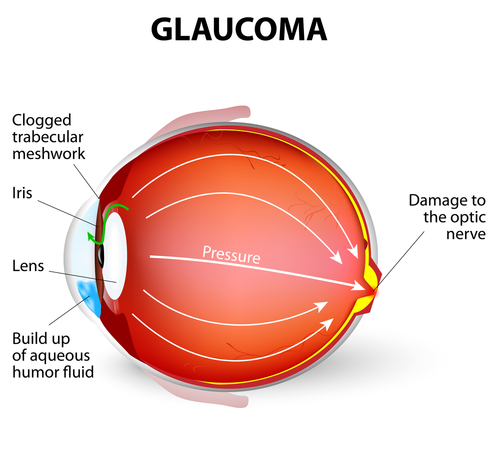Why is Glaucoma Called the Silent Thief of Sight?
May 15, 2024
Did you know that glaucoma is the second leading cause of blindness worldwide? This eye condition is called the silent thief of sight because it can develop and progress without symptoms.
The first hint that something is wrong is vision loss, which is irreversible even if you receive treatment for glaucoma. The best way to prevent vision loss from glaucoma is to schedule eye exams regularly with your ophthalmologist or optometrist.
They can examine the inner structures of your eyes and spot the early signs of glaucoma before you experience any vision changes. Prompt treatment can stop the progression of the condition and prevent vision loss. Keep reading to learn more about glaucoma and why it's called the silent thief of sight!
What is Glaucoma?
 Glaucoma is a group of conditions that damage the optic nerve. Without treatment, the damage progresses, leading to vision loss and eventually blindness. Although the exact cause of glaucoma is not fully understood, it's typically caused by high intraocular (eye) pressure.
Glaucoma is a group of conditions that damage the optic nerve. Without treatment, the damage progresses, leading to vision loss and eventually blindness. Although the exact cause of glaucoma is not fully understood, it's typically caused by high intraocular (eye) pressure.
Treatments that reduce intraocular pressure are effective at stopping glaucoma from progressing further. Anyone can develop glaucoma.
However, it's most common in people over 55 years of age. People of Black, Asian, or Hispanic heritage may also be more likely to develop glaucoma.
Certain other factors are associated with a higher risk of developing the eye condition, including:
- Family history of glaucoma
- Underlying medical conditions, such as diabetes, migraines, high blood pressure, and sickle cell eye condition
- Corneas that are thin in the center
- Extreme nearsightedness or farsightedness
- History of eye injury or certain types of eye surgery
- Long-term use of corticosteroid medicines, particularly eye drops
There is no known way to prevent glaucoma. Eye exams can identify early signs of glaucoma so you can begin treatment before your vision is affected.
How Glaucoma Affects Vision
The main effect of glaucoma is gradual damage to the optic nerve. The optic nerve consists of hundreds of tiny fibers that transmit information between the eye and the brain.
When the fibers are destroyed by glaucoma, less information travels from the eyes to the brain. When significant sections of the optic nerve are damaged, you'll start to develop blind spots in your field of vision.
Most often, people with glaucoma notice changes to their peripheral vision first. Without treatment, central vision will become affected over time. Eventually, the damage to the optic nerve will lead to blindness.
Glaucoma Symptoms
The most common type of glaucoma is called open-angle glaucoma. In its early symptoms, there are very few symptoms associated with open-angle glaucoma.
The first noticeable sign of open-angle glaucoma is loss of peripheral vision. Central vision loss is the main symptom of severe glaucoma.
In the beginning stages of open-angle glaucoma, symptoms are so subtle that you may not realize anything is wrong with your vision. A dilated eye exam is the only way to detect early signs of open-angle glaucoma.
During a dilated eye exam, your optometrist or ophthalmologist at Metropolitan Ophthalmology Associates will dilate your eyes to examine your optic nerve.
Angle-closure glaucoma is less common, as it has a more sudden onset and is considered a medical emergency. The symptoms of acute angle-closure glaucoma include:
- Severe headache
- Severe eye pain
- Nausea or vomiting
- Blurred vision
- Halos or colored rings around lights
- Red eyes
If you suspect you have acute angle-closure glaucoma, call your optometrist or ophthalmologist at Metropolitan Ophthalmology Associates as soon as possible. This form of glaucoma requires immediate medical treatment to prevent permanent damage to your vision.
Learn More About Glaucoma
How Do You Treat Glaucoma?
There are effective treatments to slow or stop the progression of glaucoma. If you begin treatment before glaucoma affects your vision, you may be able to avoid vision loss occurring.
However, treatment cannot reverse vision changes that have already occurred. Once damage has occurred, damaged nerve fibers in the optic nerve cannot be repaired.
Glaucoma treatment can only prevent any further vision loss. If you have glaucoma, you may need to stay on these medications or treatments for the rest of your life to treat the eye condition. Treatments may include:
Eye Drops
 One of the most common ways of treating glaucoma is prescription eye drops. These drops usually help decrease eye pressure by improving natural fluid drainage or reducing the amount of fluid your eye produces to prevent increased pressure.
One of the most common ways of treating glaucoma is prescription eye drops. These drops usually help decrease eye pressure by improving natural fluid drainage or reducing the amount of fluid your eye produces to prevent increased pressure.
Your ophthalmologist or optometrist at Metropolitan Ophthalmology Associates may prescribe a combination of drops to control your intraocular pressure.
Oral Medications
Your ophthalmologist or optometrist may prescribe oral medication in addition to eye drops. These medications help reduce fluid production in your eye.
Laser Treatments
A procedure called a trabeculoplasty can improve the drainage in your eyes. Your eye doctor will use a small laser to improve the drainage at the point where the iris and cornea meet inside your eye.
Your eye doctor can perform this in-office. It takes 4 to 6 weeks after laser treatment to know if it was effective, so you will need to continue glaucoma medication during that time and likely in the long term as well.
Surgical Procedures
Several surgical procedures can improve drainage in the eyes. A surgical trabeculoplasty works similarly to a laser trabeculoplasty.
Your eye doctor may recommend surgery to place tiny tubes, called shunts, in your eye to facilitate drainage. Newer techniques called minimally invasive glaucoma surgery (MIGS) can be tailored to address your exact needs. Your eye doctor will tell you which procedure is best for you.
Do you have concerns about glaucoma? Schedule an appointment at Metropolitan Ophthalmology Associates in McLean, VA, and Chevy Chase, MD, to learn more!



